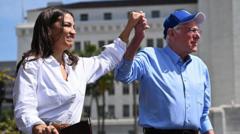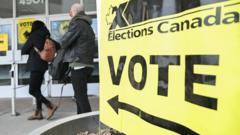With mixed feelings regarding the Democratic Party's direction, recent gatherings illustrate the urgency felt among supporters for effective action and leadership. Ideological rifts and generational divides have led to ongoing debates on how best to confront opposition while attempting to unify the party’s message.
Diverging Paths: The Future of the Democratic Party in Uncertain Times

Diverging Paths: The Future of the Democratic Party in Uncertain Times
As voices within the Democratic Party clash over strategies for opposition to the Trump administration, attendees at recent rallies voice their frustration with party leadership, reflecting a broader conflict.
In the heart of California's agricultural area, Democratic Congresswoman Alexandria Ocasio-Cortez and Independent Senator Bernie Sanders recently drew a crowd that reflected the unrest many in the party are feeling about its direction. The rally, part of their "Fighting Oligarchy" tour, took place in Bakersfield, a community where Donald Trump had a significant electoral win. For many local Democrats and left-leaning Independents, it was a moment of relief and rallying sorrow expressed through song and unified chants against perceived failures of both Trump and the Democratic leadership.
The Democratic Party finds itself navigating an uncertain path. Lack of consensus on how to counter Trump's policies has left elected leaders struggling to present a united front. Attendees at the rally voiced their frustrations, urging the party to adopt a more proactive stance. Karla Alcantar, a 26-year-old who attended the event, articulated a growing sentiment among many party supporters: a belief that Democrats need to fight back more assertively against Republican policies.
Recent polling adds further context, revealing that over half of Democrats feel their party's leadership is steering away from a suitable course. In a stark contrast to 2017, when many believed cooperation with Republicans was essential, today’s Democratic base is clamoring for a forceful opposition, with 57% desiring active efforts to resist Republican initiatives.
Political analysts like former Pennsylvania Congressman Conor Lamb note the urgency among constituents, suggesting that party leaders should advocate concrete issues impacting citizens' lives to solidify public trust. Concurrently, Sanders and Ocasio-Cortez continue to emphasize economic issues, aiming to resonate with conservative areas by spotlighting cost concerns.
As party strategists consider their next moves, they must also confront ongoing ideological schisms within their ranks. Some Democrats argue a rebranding should lean towards moderate stances to widen appeal. Governor Gavin Newsom, while maintaining a liberal identity, has recently engaged in dialogue with adversaries as a means to bridge divides, an approach that met with mixed reception from party members.
Generational tensions add an additional layer to the evolving landscape. Younger voices within the party, like gun safety advocate David Hogg, are pushing back against established figures and advocating for a fresh direction. Hogg’s commitment to challenge incumbent Democrats in safe districts has sparked heated discussions about party unity.
For many rally-goers in Bakersfield, the need for demonstrable action is paramount. Examples of passionate resistance, such as Senator Cory Booker’s significant speech against Trump, offer a glimpse of the urgent responses supporters want to see from their leaders.
As the Democratic Party reflects on its future, the ongoing struggle to define a cohesive message and strategy continues to shape its trajectory, revealing both the challenges and hopes of its supporters nationwide.






















